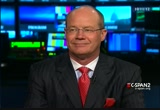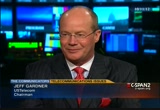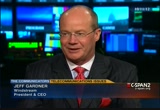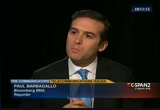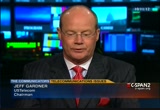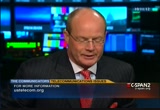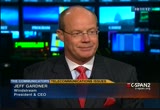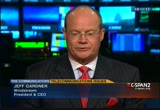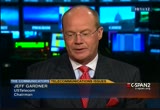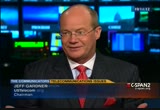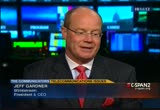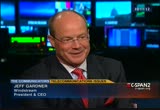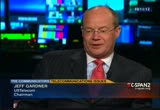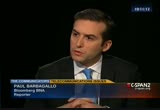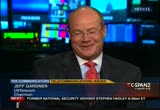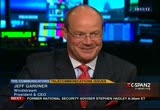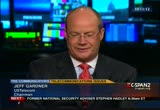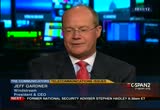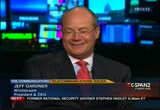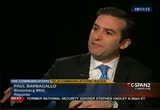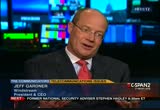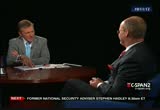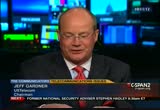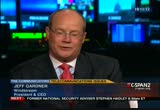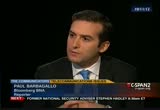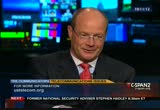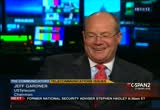tv The Communicators CSPAN November 12, 2012 8:00am-8:30am EST
8:00 am
8:01 am
gardner who has a couple of titles. number one, he's chairman of a group called u.s. telecom, and he's also president and ceo of the windstream corporation. mr. gardner, first of all, tell us what u.s. telecom is and what you represent. >> guest: well, we represent the telephone companies in the united states of america from the very biggest -- seizen, at&t -- to some of the very smallest. and what we try to do is really get together as a group, put together ideas so that we can really take care of our consumers in a better way. >> host: so when you talk about the small telephone companies, how many are there out here in the united states now? >> guest: there's thousands of telephone companies in the u.s. still, and so there's been plenty of consolidation, but there's still a lot of very small telephone companies. we have from verizon to small companies that are co-ops even involved in united states telephone association today. so still many different business issues as a part of that.
8:02 am
we all try to work together to really solve common issues. that's what the whole purpose of the association is. >> host: and we want to get into some of those policy issues in just a minute, but first of all, what is windstream? >> guest: windstream is a wonderful company. i may be bias inside that review, but we're a mainly focused in rural america. we provide local telecom service, the triple play, if you will, voice, broadband. we have very rural. we stretch there new mexico all the -- from new mexico all the way to upstate new york serving about three million customers. we're in some very rural markets. some in the state of texas the average access lines per square mile are ought, so that means eight households in a per square mile, very different than being an urban telephone company. and we've done a very good job getting these services to those customers. and we're also, we're really a story of two businesses, and then we're also focused on the enterprise segment where we're
8:03 am
selling to medium and small businesses, telecom services, everything from cloud computing to broadband to voice. >> host: so who are some of your competitors, and who are some of your collaborators? >> guest: our competitors, telecom is complicated, right? was many of your friends are -- our friends are also our competitors. we compete with the cable companies, wireless companies, those would be our principal competitors. >> host: and do you ever collaborate with those companies? >> guest: all the time. today i'm going to meet with at&t, sizen, other -- verizon, other companies like them. we also wok together to provide services to consumers in many ways as well. >> host: well, here to help us explore some of the policy issues is paul barbagallo, he's a reporter. mr. barbagallo, welcome. >> thank you. hi, jeff. >> guest: it's good to see you.
8:04 am
>> good to see you. so one policy initiative at the federal communications commission that has affected your company is universal service fund reform. and a year ago this month the fcc put forth a major restructuring plan to convert $4.5 billion subsidy fund that had focused mainly on helping, helping companies pea for -- par the cost of providing rural telephone service, and they've converted this into a broadband subsidy fund. so a year lateerer, has the fcc achieved its goal? >> guest: well, there were two parking lots to that, right? huge changes in terms of intercarry compensation, which the way in which we pay one another. and there needed to be a great deal of clarification around that issue. and then the second part of that -- and we've made a lot of progress. we've taken the first step there. that's in process. around universal service
8:05 am
funding, we absolutely got it right in terms of the focus needed to change away from voice. consumers place much less value and utility in the voice and much more in the broadband today. so i think the fcc and the usda and the cable companies, we all have that right. we need to get more broadband into rural america. um, so i think we've got it right for the most part. the challenge has been as we look through those, those have pretty significant financial consequences to some of the companies involved, and the idea was that these would be coincident, that the icc or intercarrier comp reform would take place at the same time as universal service funding, and i'd say we're a bit behind on the universal service funding side. we've got it right focusing on broadband. i think in large part, um, trying to make money available to carriers to build broadband out to consumers who can't get
8:06 am
it today, but there's much to be done. there's much work that needs to be done. and unfortunately, it's going to be, um, behind the intercarrier compensation piece. so that's what i'd say we've got to get right. the fcc's working very hard on it. i just think we all have to be committed to work hard and get this done fast. because one to have fundamental concerns -- one of the fundamental concerns about our members at united states telephone association is we do it in a way that maintains the financial stability of our companies. in order to do that, you really have to deal with both these complicated issues at the same time. >> and this fund, the reform of this fund is one of the many policy initiatives to get broadband into rural areas, right? >> guest: uh-huh. yes, it is. and i'm very proud of our, um, our company, first of all, windstream, who's -- even though we're in very rural markets as i mentioned earlier, 93% of our customers can get broadband
8:07 am
today. that's an incredible amount given the density in our marketplace. the, in terms of getting to that last 7% is very difficult. it's uneconomic, it's going to involve public/private partnership to make that happen. and that's the real challenge. >> host: well, mr. gardner, you talked about the 93%. have you partaken of the access america, the broadband act funds, and how have they contributed to increasing that percentage? >> guest: well, we were a participant in a very small way. when there's -- we're a price cap company, as they call verizon, at&t. some of the large to midsize carriers, and the fcc wisely knew that to come up with a new model would take some time, so they set aside $30 million a year, annually to fund investment in rural america while we work through this model. and windstream was eligible to
8:08 am
take advantage of up to $60 million of that. the part that i think we got slightly wrong with regard to that was setting a limit at 775. so unless you could add a customer for an incremental $775, you couldn't take the money. in a case like windstream where we had built out so extensively in our networks with private money, we were unable to take, um, i think we took about 1% of that $60 million. so the unfortunate part, we got the policy right. we've got $300 million this year and $300 million next year, but with that limit, we're going to be able to use very little of that x that's why we've filed a waiver to ask the fcc to think about that in a different way. >> host: and what's been the response so far from the fcc on that? >> guest: the fcc just filed a rulemaking, which is promising, on our waiver request which is really to understand that let's look at the fact that 83% of
8:09 am
those unserved customers today in america are served by midsized companies like windstream. and the fact that we've made a lot of investment, we've made those kind of low-hanging fruit kind of investments. the people that we need to get today are in very sparsely populated areas, and it will require much more investment today. and so recently we've been in dialogue with the fcc on that. i've -- they're definitely listening to us. they're setting this out to rulemaking. i'm just hoping it happens fast enough. i mean, if you look at this, and this is how our association is trying to look at it, from the consumer perspective, let's get the policy right, but most importantly, let's get the broadband to these rural consumers as quickly as possible. i get letters every day from customers in unserved areas who are just dying to have a broadband alternative. you can imagine living somewhere out in the middle of nowhere without access to broadband.
8:10 am
we all have it, we take it for granted, but the reality is some of these people can't get it today. >> host: paul barbagallo. >> i -- aside from hastening the deployment of broadband, the fcc has been focusing on hastening the adoption of broadband. they found even in areas where internet access is available, some americans are not subscribing. at windstream, are you finding that to be the case? >> guest: i think that's a real issue, right? in some cases there's affordability. we worked very hard on that at windstream in terms of devising price plans at the very low end so maybe people can get low-end services. but it is a reality. there are a number of people who are served today but can't afford it. and so we've been working with the fcc, with the ufta on ways to help get access for these people who cannot afford
8:11 am
broadband. you can't give it away, but fundamentally, it's an empowering technology for these people, especially the young people, who um, are trying to find a way to build a better life. and broadband can be an enabler there. so from a philanthropic perspective, we've also been trying to direct some of our efforts that way as well. but postally from a pricing -- mostly from a pricing perspective, we're trying to make it as affordable as possible for these people to get broadband. >> cost is one deterrent. is lack of a computer, digital literacy, what are some of the other issues -- >> guest: that's absolutely an issue. access to computers for, um, young people in the home is a real issue. in some homes in urban, poor areas, they don't have the digital literacy that you thought about, -- that you talk about, and that's a broader issue. we've been working more on a
8:12 am
state-by-state basis within windstream. the usta has been very involved with that, carrying on dialogue with the fcc on how we might help there, but we've got a lot of work to do there. >> host: paul gardner -- or jeff gardner, when it comes to mobile broadband, is that included in the access america plan, the broadband plan? >> guest: it is. i mean, they contemplate all different kinds of technology. i think that one of the mobile broadband is certainly going to play a big role as some of the large companies have rolled out advanced services, 4g is the latest that you hear about from the big, um, wireless companies which is certainly improving the broadband capabilities. um, but i think that, you know, fundamentally everybody, um, i think misses a couple of points here often, and that is without a land line connection, there is no wireless. because it's all going back to the public switch telephone
8:13 am
network. so it's very important that we pay attention to both types of infrastructure. and just around physics, i think of mobility, um, as always going to be a complementary service. it's not going to be a replacement for wired broadband. um, more and or more people are going home and offholding from maybe their wireless access to their wi-fi access that they have through their wired provider. and it's because of things like spectrum limitations, etc. so for that to work if concert, i think of mobility and wired broadband access as complementary. >> host: um, so much policy right now or so much of the policy discussion is focused, though, on wireless and that mobility. so what you said is a little, a little off from what we're hearing here in washington. >> guest: well, i think there's definitely, um, opinion a big focus -- been a big focus on wireless and what the capability is. we're out there in the world today and understand the
8:14 am
spectrum limitations are real, um, engineers will tell you about that, that it just can't deliver the kind of bandwidth that we need to really accomplish the goals that businesses and consumers want in their homes. and so what we're trying to do at the usta is constantly remind people that without the wired network, you're not going to have the wireless network. and so, um, the policymakers, i think, understand it better than ever, that, um, you need fiber facilities into these cell towers in order to enable them to carry broadband at faster and faster speeds, and you need better and better, um, access to broadband capabilities in the home. >> host: jeff gardner is president and ceo of the windstream corporation, and he this year is chairman of the group us telecom. paul barbagallo is with
8:15 am
bloomberg. >> so we talked about universal fund reform, and on issue facing the fcc is how to pay for this fund going forward. they took a step to support broadband service rather than telephone service, and for years while the fund supported telephone service, it was paid for by telephone customers. so going forward, how how shoule fcc approach this issue, and, more importantly, who should pay into this fund? >> guest: it's a real difficult issue. as you said, it's kind of ironic that it's being funded by the part of the area which is declining, which doesn't seem like it's going to be able to keep one the need there. and so a broader technology agnostic approach is probably called for. there, as you foe very well, there are a lot of political implications. there's a lot of sensitivity around taxing the internet. i suspect you've heard from time to time.
8:16 am
so i understand those issues, but i do, um, also just economically and with the trends that we see in our country, you've got to broaden the base somehow. i don't have the answers to that today, but i think that's something that we're going to really have to work together over the next several years to figure out. because the reality is the world has changed. the wired telephone network is no longer going to be able to support the usf fund, it's going to take a broader base, and that's going to be required. because at the end of the day, um, there's to simple solutions here. these consumers live in the areas for whatever reason, some by choice, some by that's where they grew up, and that's where they live today. but it is uneconomic for us to serve them. so the broadband fund is absolutely necessary. there's no other way to get
8:17 am
service. we're public companies. we have to earn a decent return for our shareholders. we're going to do everything possible, um, and i believe we've done that at windstream. i'm so proud of our members at the usta for what they've done. we've spent $66 billion a year in each of the last five years to get to rural customers, and we've done a good job doing that. we employ 500,000 people across the country in great jobs that pay 40%, i think, above the national average. but there's much more that needs to be done. and so that's a tough question that feeds to be worked out, um, and that's why it's so important, what's going to happen in the next year in washington. we've got our agenda tonight at our board meeting. >>st well, jeff gardner, we talked about the board meeting, in the will air before the election. how would you assess the current
8:18 am
administration, the current congress, and would you favor any changes november 6th? >> guest: without talking about whether i'd prefer one president over the other, um, i do favor changes. it's been a very frustrating year. it's been a frustrating time, not just a year. several years here where our policies seem to be more short-term oriented while we're making long-term decisions. i had a meeting with my team yesterday where we had to make investment decisions, and these are, these are 10 to 20-year type investments, yet we're live anything if a country that has tax policy that maybe has a six month, we can look forward six months and say we know big things are going to happen on 12/31. and this fiscal cliff we're headed toward is also something we're going to talk about. we're very, very worried about it. and so what i'm hopeful regardless of who wins, that we
8:19 am
find a way in this country to have better discourse between both parties so that we can make progress. in the boardroom, we don't have the luxury to sit there and reach -- and walk out without a conclusion. we've got to make decisions about how to invest our shareholders' money, how to better serve our customers, and for the good of our consumers, for the good of our businesses, um, to get jobs growing again i just hope whatever happens in this election that these, that these debates, that this discussion fosters a more bipartisan approach. it's been very us from tauting. i've told -- frustrating. i've told that to both our democratic senators and our republican senators and congressmen, that we've just got to learn, we've got to get some things done. we've got to give clarity to these issues in the american business. and i'm especially concerned about the tax policy. and, um, many of the companies
8:20 am
in our industry pay a dividend, as you know. and, um, if left alone and the bush tax cuts expire on 12/31, that tax rate goes up, um, to over 40%. which has real implications. and at the same time, it becomes disconnected with the capital gains rate which i think is, um, is very, very important to keep both of those low and linked. it encourages investment. with respect to dividends, it matters a lot to, um, our shareholders. people think about dividends more from a corporate perspective. i just had a shareholder meeting in little rock two months ago, and there are people who are really living off these dividends. they're buying these telecom stocks and rely on these dividends to pay their mortgage, to pay for their groceries every
8:21 am
week. i had amazingly -- because shareholder meetings are getting smaller and smaller, fewer people attend -- i had one elderly couple drive in from kansas city, another from seattle, washington. both came up to me and said, mr. gardner, i just have one question: are you going to keep your dividend? so it's just not big, corporate america. i think we've got to look at the people that are relying on these. so this tax policy is very, very important. we've got to get this right, and we've got to get republicans and democrats working together in this country, um, so that we can get things done and create jobs and get this economy moving again. >> one issue, um, beyond the fiscal cliff that telephone companies are facing now is cybersecurity, how to secure, um, our networks. excuse me, your networks. can and u.s. telecom has
8:22 am
advocated the position that congress should enable better sharing of information between companies, telephone companies themselves and the government. why, why would this approach, um, be better than regulation? >> guest: well, i think with regulation comes, um, a concern that we'll be overregulated, and we won't be able to run our businesses the way we need to. and i think the last thing we need is another, um, regulatory entity that's designed to oversee an industry. we can handle this ourselves. i think that, um, we're the experts. we know what needs to be done. today there's unprecedented cooperation between companies. and we want to work closely with the government. they're getting more of these cyber threats than, um, or as many as business today. so the cooperative way without creating additional regulation, which to us translates to money
8:23 am
and taxes, we think is a better way to handle it. >> and right now there are a number of legal considerations, too, right? that companies cannot freely share information. if one company spots a cyber threat, then there are a number of legal issues that they can't say, hey, manager's coming -- something's coming. >> guest: right. and that's one thing we really have to deal with, and that's why so much time has been spent on this cybersecurity regulation, so that we can feel more comfortable around sharing in the without getting into difficulty around these regulations. it's a real issue in this country today. >> host: and we're talking with jeff gardner of u.s. telecom and windstream and paul bash gal he of -- barbagallo of bloomberg. mr. gardner, with a new congress what -- how do you feel about the a rewrite of some of the major telecommunications legislative pieces, 1996 telecom
8:24 am
act? do you think it's important treat your business as one big whole, or do you think a piecemeal approach to legislative policy changes is the way to go? >> guest: well, i think '96 was a long time ago, and, um, there are some great parts of the '96 act that i think encourage competition, which is very good for the consumer. so we need to make sure that we pay attention to that. but let's face it, look what's happened with the internet between 1996 and 2012. the whole world's changing. that's what the intercarrier compensation and usf reform, all these issues that we've been talking about -- >> host: but all piece peel? >> guest: i would say -- i don't really think of it that way. this stuff is all happening realtime. i don't see a way to deal with them collectively in one big piece of legislation, but
8:25 am
probably better to deal with each of these individually. >> host: you call yourself still a telephone company, but is there such a thing anymore in. >> guest: no. we're a communications company. i mean, the voice, voice is still important to our can customers, but mostly what we're offering today is communications; broadband, children and texting and e-mail are a much more valuable to customers, getting internet entertainment. we're much more of a communications company today. and so when we refer to windstream internally and externally, it's now as a communications and not a telephone company. >> host: should windstream, verizon, comcast, at&t, should they be regulated in the same way? >> guest: i think they should. i think they should. when you look at, um, what we're doing, um, we're both trying to
8:26 am
serve the same set of customers. um, those businesses have changed very much in the haas ten year -- in the last ten years in terms of the cable companies getting into the telephone business. we are, we're getting into the video business. and so you've got to take a look across. and we all need access to, um, entertainment content to play out our business models, and so i think you've got to take a much broader look and not treat the telephone companies differently. >> host: paul barbagallo. >> as congress prepares for communications act rewrite in the next year or so, um, what should be the guiding principle? um, we had an act that, um, that really was designed to open up competition in telecommunications markets, so as we move forward, um, what, i mean, what on a very high level
8:27 am
what should be the guiding principle? >> guest: if i were starting out today, i would use my guiding principle as the consumer. and really how much progress have we made in terms of enabling them especially with broadband. i think that should be the cornerstone in terms of how they, how congress thinks about acceleration and our ability to get broadband everywhere into america which we can't today without different programs. and i think if you focus on the consumer, you can't go wrong. >> what should be the role of the fcc in a new, in a new future regime? >> guest: well, i think the fcc -- listen, they've tackled a big challenge in the last four years with dealing with intercarrier compensation and universal service reform. i think what they need to be focused on in the short run is executing on that. we've got the intercarrier comp
8:28 am
piece done. the focus in the short term should really be on universal service reform and really thinking about are we doing the best job possible getting broadband out to rural america. >> host: jeff gardner, when you're working, how much of your time is spent worrying, talking about, reacting to decisions made ear in -- decisions made here if washington? >> guest: far more than i'd like. obviously, the intercarrier compensation and universal service reform, by role at the usta, we've all had to come together as an organization. i'm very proud of the fact we did and really worked with the fcc hand in hand on that. but it's, it's very important. this policy is very important. um, but it does take away time that you should be spending focusing on your customers and building on your business plan.
8:29 am
thank goodness i have very competent people back at headquarters and all throughout the country. we're in 48 states. worrying about our consumers. but it is very important, and i'm going to continue to spend my time here because it matters. we've, um, invested in our washington office here. i think decisions that we're going to makeover the next four years are going to have profound implications on the health of our business in that time period and our ability to really accomplish what we want to, which is to get to these rural customers. >> host: time for one more question, paul barbagallo. >> well, if you could, um, if you could have a wish for the fcc to tackle any issue you want, what would it be? >> guest: i would really like -- i'm going to give you two things. >> two wishes. >> guest: first, to deal with this usf issue in the short run issue and the $300 million that they made available to t
149 Views
IN COLLECTIONS
CSPAN2 Television Archive
Television Archive  Television Archive News Search Service
Television Archive News Search Service 
Uploaded by TV Archive on

 Live Music Archive
Live Music Archive Librivox Free Audio
Librivox Free Audio Metropolitan Museum
Metropolitan Museum Cleveland Museum of Art
Cleveland Museum of Art Internet Arcade
Internet Arcade Console Living Room
Console Living Room Books to Borrow
Books to Borrow Open Library
Open Library TV News
TV News Understanding 9/11
Understanding 9/11
